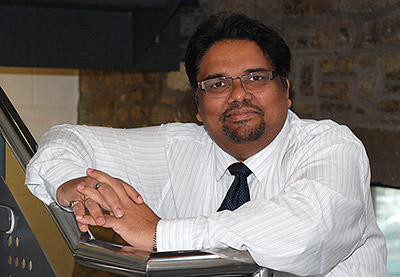University of Huddersfield – an R&D centre for the region’s SMEs

Wed, 05 Aug 2015 01:49:00 BST
The University’s Energy Emission and the Environmental Research Group has nine Knowledge Transfer Partnerships with seven firms
 ONLY very large companies can afford their own in-house R&D departments. But ambitious smaller firms can acquire research and development expertise by teaming up with universities, says a professor who has overseen a ten-year sequence of partnerships with industry.
ONLY very large companies can afford their own in-house R&D departments. But ambitious smaller firms can acquire research and development expertise by teaming up with universities, says a professor who has overseen a ten-year sequence of partnerships with industry.
At the University of Huddersfield, Professor Rakesh Mishra – an expert in fields such as thermodynamics, automotive power units and computational fluid dynamics – heads the Energy Emission and the Environmental Research Group. It has more than 30 members, associates and research students. And it has been notably successful in winning Knowledge Transfer Partnerships (KTPs), attracting total funding of more than £1.5 million.
 KTPs are part-funded by the Government via Innovate UK (formerly the Technology Strategy Board). They have an academic supervisor and a KTP associate, normally a highly-promising graduate or postgraduate student who is based at a company that seeks to develop new products or make major improvements to existing lines or processes.
KTPs are part-funded by the Government via Innovate UK (formerly the Technology Strategy Board). They have an academic supervisor and a KTP associate, normally a highly-promising graduate or postgraduate student who is based at a company that seeks to develop new products or make major improvements to existing lines or processes.
 During the period of the KTP – typically two or three years – the associate might also work towards new qualifications, such as a doctorate.
During the period of the KTP – typically two or three years – the associate might also work towards new qualifications, such as a doctorate.
This year marks the tenth anniversary of Professor Mishra’s first involvement with KTPs. Since 2005, there have been nine partnerships with seven firms. Two of them – Weir Valves and Blackhall Valves – have either multiple KTPs or associates. Three projects were completed between 2005 and 2010. Six projects are ongoing and another – a planned second partnership with HR Blowers – is in the pipeline.
 Professor Mishra acts as academic supervisor for two of the current KTPs – with HR Blowers and Weir Valves – but he has been the project manager for the entire roster of projects. The other current supervisors include Dr Suman Pradhan, who is involved with the Basildon-based RLE International on a project to improve the design of electric vehicles; Dr Taimoor Asim, who is the supervisor for a KTP with Halifax Fan that is carrying out an aero-acoustic analysis of centrifugal fans; and Kuldip Ubbi supervises projects with Blackhall Valves.
Professor Mishra acts as academic supervisor for two of the current KTPs – with HR Blowers and Weir Valves – but he has been the project manager for the entire roster of projects. The other current supervisors include Dr Suman Pradhan, who is involved with the Basildon-based RLE International on a project to improve the design of electric vehicles; Dr Taimoor Asim, who is the supervisor for a KTP with Halifax Fan that is carrying out an aero-acoustic analysis of centrifugal fans; and Kuldip Ubbi supervises projects with Blackhall Valves.
 Explaining why he places such a high importance on forming KTPs, Professor Mishra said: “I see universities as a R&D centre for small-to-medium sized firms in the region. This is because SMEs don’t usually have the resources to do their own research and development.
Explaining why he places such a high importance on forming KTPs, Professor Mishra said: “I see universities as a R&D centre for small-to-medium sized firms in the region. This is because SMEs don’t usually have the resources to do their own research and development.
 “I look at it in a very holistic way. Universities produce engineers. Engineers go and work in industries. And when the output of industries increase, the nation’s productivity increases.”
“I look at it in a very holistic way. Universities produce engineers. Engineers go and work in industries. And when the output of industries increase, the nation’s productivity increases.”
KTPs are also an immensely valuable experience for the postgraduates involved in the research, said Professor Mishra.
“Because they are working on an industrial product or an industrial process, it is practical, grounded research and because they are doing a PhD there also must be originality and novel features in what they are doing. This adds a lot of value in the industrial products and processes.
“I try to go for two to three-year KTPs, because they can add a lot of value to the company over that time,” he added.







